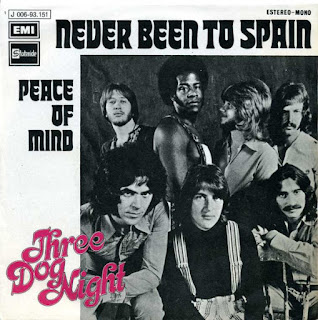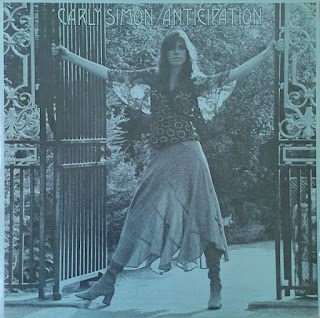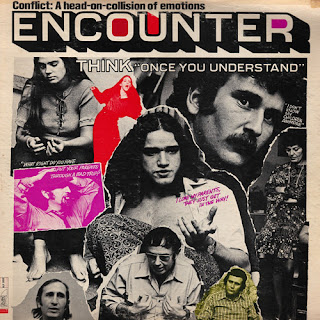Three Dog Night—“Never Been to Spain.”Dunhill 4299; Top 40 debut: 1/8/72. Peak date: 2/12/72. Written by Hoyt Axton. Produced by Richard Podolor. B-side: “Peace of Mind.” LP: Harmony. Charts: Billboard Hot 100 (#5), easy listening (#18).
Oklahoma songwriter Hoyt Axton’s fried nursery rhymes were a natural fit for early ‘70s AM radio. It’s possible that no one would have known this if Three Dog Night (always crafty song pickers) hadn’t taken a chance with his “Joy to the World,” which ended up seeping deeply into the era’s singalong culture. Axton’s bluesy “Never Been to Spain,” the group’s twelfth Top 40 hit, had a similar appeal abeit in the form of a slow boil. It took three full verses for all three throats to start wailing together and for the church of what-does-it-matter’s revival meeting to get into full swing.
Like the most memorable of the era’s hits, “Never Been to Spain” made people want to join hands and sing away their troubles. Popular taste for such fare made for a blurred boundary between the adult and youth markets and generated an influx of borderline novelty songs, a situation songwriters like Jim “Spiders and Snakes” Stafford and Loudon “Dead Skunk” Wainwright III were watching closely. It also cultivated a taste for stage-friendly “show band” rock, the kind all ages could enjoy, and which Three Dog Night did better than just about anyone. Rock critics tended to chafe at the mega-successful outfit’s finesse. Robert Christgau called them the “Kings of Oversing,” a criticism that would have raised Engelbert Humperdinck’s eyebrows, and comes off today as something of an oversling, shall we say, amid our digitally-enhanced emoting.
“Never Been to Spain” appeared as the opening track for their Harmony LP, and it called on Cory Wells to do lead duties for the trio of similar-sounding singers. The album tends to hold a fond place in TDN fans’ hearts for its variety and structural integrity, with standout tracks such as Moby Grape’s “Murder in My Heart for the Judge” and Joni Mitchell’s “Night in the City.” The 45, a bookend job, showcased the Harmony album’s opener on side A (“Never Been to Spain”) and closer (“Peace of Mind”) on side B.
About the B side: Former New Christy Minstrel Nick Woods had composed “Peace of Mind,” and Nina Simone and Nancy Wilson both recorded striking versions of it in 1968. In contrast to those, Three Dog Night gave it a spare and reverent rendering with only Jimmy Greenspoon’s piano and Chuck Negron’s voice. It also tacked on an introductory Negron recitation of a poem called “Mistakes and Illusions” written by his wife Paula, who received credit on the album packaging but none on the 45 label. In short order this recording would serve as an elegy for Woods, who died of an accidental drug overdose at the home of his friend, the arranger and producer Kirby Johnson, on February 17, 1972, at the age of 33. (Source: San Diego Union, Feb 23, 1972, B-3)
As for subject matter, “Never Been to Spain” catalogs places the singer has never been, including Spain and England (whose Beatles he kinda likes). The last verse focuses on songwriter Axton’s home state of Oklahoma, which he at first seems to equate with heaven. He actually played some football at Oklahoma State University, where the marching band now blasts “Never Been to Spain” during the 4th quarter. If you listen to Axton’s original 1971 recording of the song, though, you’ll hear him sing “from Oklahoma, born in a coma,” a somewhat less glowing declaration that mostly brings the concussive football connection into sharper focus. (Three Dog Night changed it to “Oklahoma, not Arizona.”) The group would bring one more single (“Family of Man”) from Harmony into the Top 40 before pumping out a new album in March 1972. (The image above is what the picture sleeve looked like in Spain.)
Side A: "Never Been to Spain"
Side B: "Peace of Mind"
Side B: "Peace of Mind"





